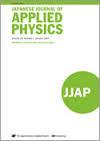基于表面等离子体共振的D型微结构光纤温度传感器
IF 1.5
4区 物理与天体物理
Q3 PHYSICS, APPLIED
引用次数: 0
摘要
为了解决光子晶体光纤外表面金属膜氧化和传感器灵敏度低的问题,提出了一种基于表面等离子体共振的侧面抛光温度传感器。首先,使用温度敏感液体作为温度感测物质,在传感器的光纤侧上用金属涂层对传感器进行建模。然后,进行了模拟计算,以计算光纤的结构参数以及金属材料对损耗谱共振波长的影响。通过比较不同金属膜的敏感度,选择金作为表面等离子体传感材料。最后,利用有限元方法对传感器的传感特性进行了仿真。结果表明,当金用作表面等离子体材料时,波长范围为675–1117 nm,并且可以实现0°C–60°C温度范围内的高灵敏度传感。当温度为0°C时,最大光谱灵敏度为24.6 nm°C−1。所设计的传感器具有优异的性能,可广泛用于温度传感。本文章由计算机程序翻译,如有差异,请以英文原文为准。
D-shaped microstructure fiber temperature sensor based on surface plasmon resonance
In order to solve the problems of oxidation of the metal film coated on the outer surface of the photonic crystal fiber and the low sensitivity of the sensor, a side polishing temperature sensor based on surface plasmon resonance is proposed. First, the sensor is modelled with a metal coating on the side of the optical fiber of the sensor, using a temperature sensitive liquid as the temperature sensing substance. Then, simulations were carried out to calculate the structural parameters of the optical fiber and the effect of the metal material on the resonant wavelength of the loss spectrum. By comparing the sensitive sensing of different metal films, gold was chosen as the surface plasma sensing material. Finally, the sensing characteristics of the sensor are simulated using the finite element method. The results show that when gold is used as the surface plasmon material, the wavelength range is 675–1117 nm, and the high sensitivity sensing in the temperature range of 0 °C–60 °C can be realized. When the temperature is 0 °C, the maximum spectral sensitivity is 24.6 nm °C−1. The designed sensors have excellent performance and can be widely used for temperature sensing.
求助全文
通过发布文献求助,成功后即可免费获取论文全文。
去求助
来源期刊

Japanese Journal of Applied Physics
物理-物理:应用
CiteScore
3.00
自引率
26.70%
发文量
818
审稿时长
3.5 months
期刊介绍:
The Japanese Journal of Applied Physics (JJAP) is an international journal for the advancement and dissemination of knowledge in all fields of applied physics. JJAP is a sister journal of the Applied Physics Express (APEX) and is published by IOP Publishing Ltd on behalf of the Japan Society of Applied Physics (JSAP).
JJAP publishes articles that significantly contribute to the advancements in the applications of physical principles as well as in the understanding of physics in view of particular applications in mind. Subjects covered by JJAP include the following fields:
• Semiconductors, dielectrics, and organic materials
• Photonics, quantum electronics, optics, and spectroscopy
• Spintronics, superconductivity, and strongly correlated materials
• Device physics including quantum information processing
• Physics-based circuits and systems
• Nanoscale science and technology
• Crystal growth, surfaces, interfaces, thin films, and bulk materials
• Plasmas, applied atomic and molecular physics, and applied nuclear physics
• Device processing, fabrication and measurement technologies, and instrumentation
• Cross-disciplinary areas such as bioelectronics/photonics, biosensing, environmental/energy technologies, and MEMS
 求助内容:
求助内容: 应助结果提醒方式:
应助结果提醒方式:


